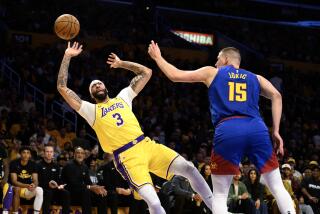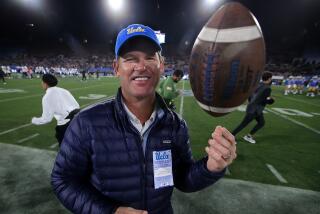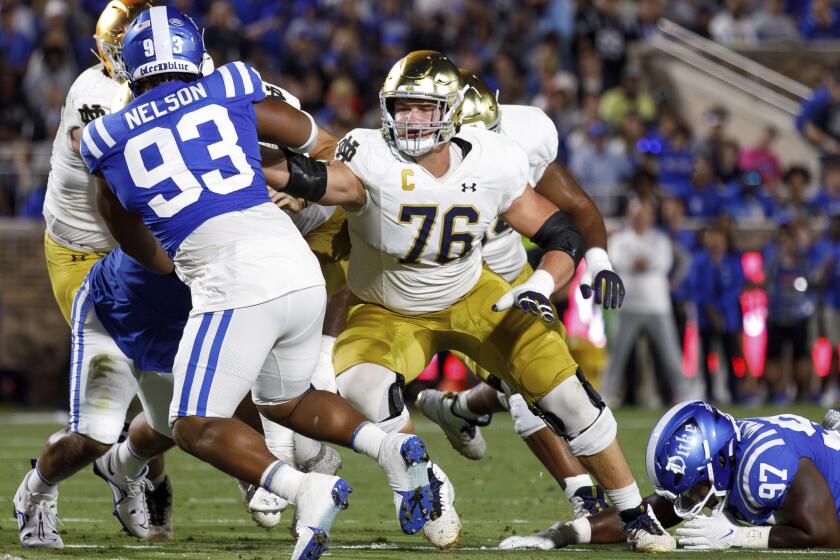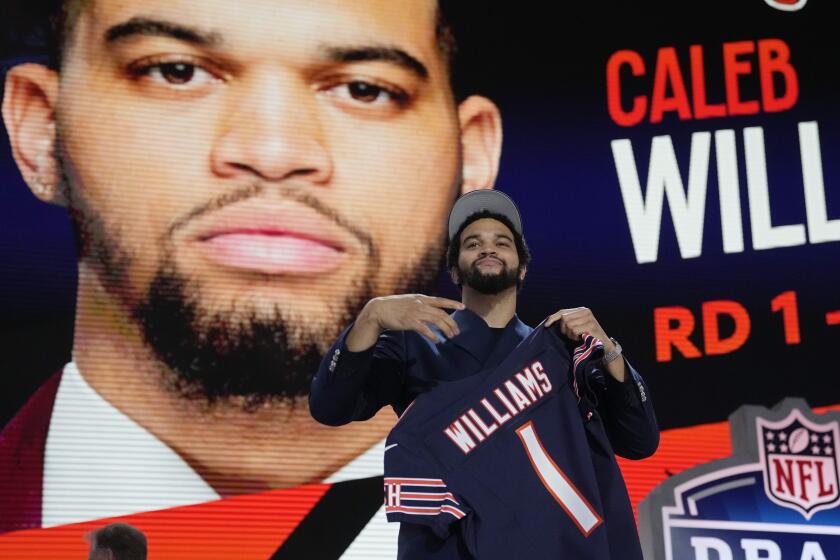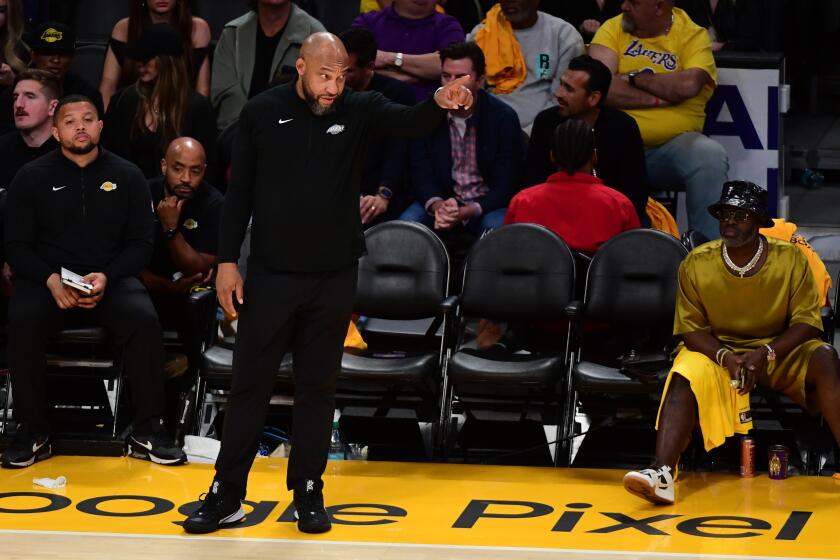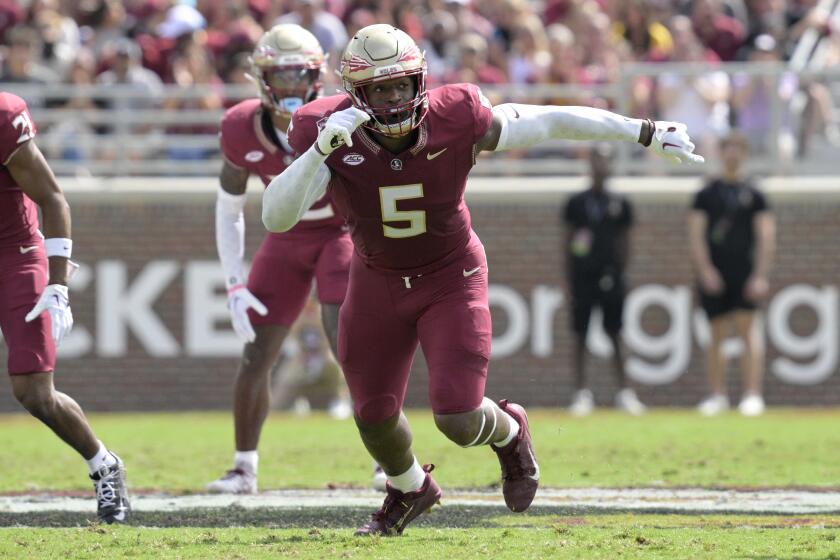ANALYSIS : Talks in Late Innings; Can Ueberroth Get Save?
For the last two weeks, since the baseball players’ union set an Aug. 6 strike deadline, the sides in the major league contract talks have been playing the equivalent of a game of chicken.
As the deadline approaches, each side stubbornly refuses to tip its hand as to what it really wants or is willing to accept in terms of a settlement, waiting for the other to crack first.
But now there are only nine days left, and unless someone--perhaps Commissioner Peter Ueberroth--is ready to initiate the hard bargaining soon by proposing serious terms, the walkout that neither side says it wants will occur. “If there is a strike, it will be a long one,” union leader Donald Fehr said recently.
Even now, however, 8 1/2 months since the beginning of talks aimed at replacing the three-year collective bargaining contract that expired last Dec. 31, it still appears possible that a strike will be averted. In most labor disputes, the serious negotiating--as opposed to the posturing--comes down to the last few days.
Baseball is having its best season in several years, with attendance up a reported 10% over the record year of 1983. Neither the union nor the owners appear in a particularly militant mood. This time, unlike 1981, the owners do not have strike insurance. Finally, it appears that Ueberroth would like to use his considerable skills to try to prevent a strike.
The terms of a settlement may even be fairly clear. To the extent that the union has its way and no restraints are written into the next contract to slow the rate of salary increases, the union will probably have to accept a considerably smaller share of baseball’s national television revenues than the one-third it has traditionally received for the pension fund.
If, on the other hand, the owners prevail and there are salary restraints, the owners will probably have to move toward the union’s position on pension money.
Salaries now, however, are likely to mean more to the players than pensions later.
Whatever happens, players’ benefits probably will continue to rise, even though the owners have been making a major effort to convince both the union and the public that most of the baseball clubs are in such serious financial trouble that they cannot afford to pay much more than they are now. The owners’ side cut its estimates of losses about in half last week, but the numbers they are using still are sizable.
Despite union objections to figures the owners have presented, the campaign has had its effect. Regardless of what settlement is finally reached, there is little prospect that salaries will double in the next four years, as they have in the last four, when they went from an average $185,000 to $363,000.
It also seems unlikely that the players will conserve their full one-third share of the television revenues, since that would mean an immediate increase in annual pension contributions from $15.5 million to about $60 million.
The owners are offering an increase in the minimum salary from $40,000 to $60,000. Above that, players will be free to negotiate their best deals, but the owners would like to regulate salaries at least somewhat by readjusting rules for salary arbitration and possibly free agency, or setting an overall salary cap.
What are the possibilities that things will get off dead center in the next few days?
They are probably quite good, although it is not clear now from what the sides have said precisely how it might happen.
In fact, listening to the speculation around the New York headquarters of both the union and the owners, there is not even any agreement as to who is really the senior negotiator on each side.
Fehr is the union leader, but the retired leader, Marvin Miller, who won a series of victories for the players with his negotiating skills, is still active and attending most of the negotiating sessions. Fehr says that Miller’s exact position has been kept intentionally obscure. Ueberroth and the owners’ negotiators seem uncertain whether it is Fehr or Miller who is in charge. Miller, however, says Fehr is.
On the owners’ side, the former American League president, Lee MacPhail, is the chief negotiator, assisted by attorney Barry Rona. Ueberroth has repeatedly told Fehr that MacPhail is fully authorized by the owners to negotiate a settlement. Fehr has said he doubts it, that he thinks MacPhail must check every small point with the owners. He also has said that the owners do not appear to be unified, and do not have a strong leader among them as in the days when the late Walter O’Malley of the Dodgers was the dominant figure.
No owner has emerged as an articulate spokesman for the owners. The four-member owners’ negotiating council, composed of Bud Selig of the Milwaukee Brewers, Peter O’Malley of the Dodgers, John McMullen of the Houston Astros and Edward Bennett Williams of the Baltimore Orioles, has so far been very quiet. MacPhail has been doing the talking, and he is not exactly a charismatic figure.
In recent weeks, there have been some signs of strain between MacPhail and Ueberroth. There are reports that MacPhail is irked at Ueberroth for undercutting his proposal for a salary cap by going around to players’ meetings and debunking the idea.
Ueberroth may wind up as the key figure, although the path of his involvement is not clear now. As commissioner, Ueberroth was hired and is paid by the owners. Past commissioners have either been on the owners’ side in labor disputes or have said nothing.
Despite Ueberroth’s recent statements opposing the salary cap and staking out an independent position for himself, union leaders remain suspicious of him. Both Fehr and Miller have said repeatedly that if Ueberroth wants to come into the talks, he should replace MacPhail as the owners’ authorized representative. They have given the impression they would not mind that happening.
Fehr, however, has also hinted on occasion that, depending on circumstances, there may be another role for Ueberroth.
There have been reports that the commissioner would like to be invited in as a kind of mediator, that he would like to enter the negotiations, persuade both sides to compromise, prevent a strike and, once again in his so far spectacular career, emerge the popular hero.
The trouble with that scenario is that the union, for now, says it will make no such request, and there are only nine days left.
Another suggestion is that Ueberroth may simply present his own terms, leaning toward the players and then challenge the owners to come around or fire him. That seems very dramatic.
Ueberroth, however, is a man of surprises, and it may take surprises to get these talks moving in a constructive direction.
More to Read
Get our high school sports newsletter
Prep Rally is devoted to the SoCal high school sports experience, bringing you scores, stories and a behind-the-scenes look at what makes prep sports so popular.
You may occasionally receive promotional content from the Los Angeles Times.
